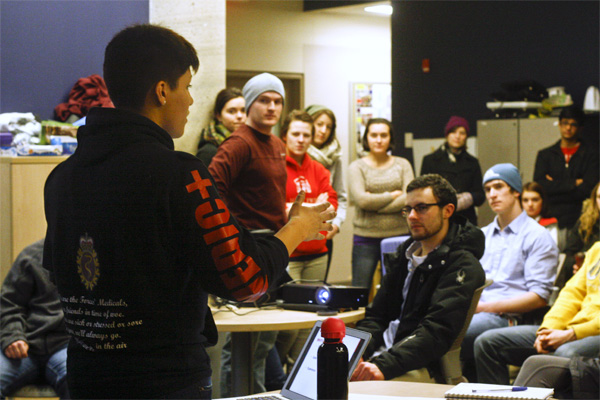Unit aims to provide Red Cross emergency first responder level training
Photo by Tina WallaceThe University of Ottawa Student Emergency Response Team (UOSERT) gathered for its first meeting on Jan. 22 with the hopes of establishing a campus-wide first response unit.
The organization, which is slated to receive club status in February, will go further than administering first aid certifications to its members. Founder Imroze Shaheen said the program will train students to the Red Cross emergency first responder level.
“It’s basically right below paramedics,” Shaheen said. “You train firefighters, you train policemen to this level. It lets you administer oxygen, deal with spinal trauma, head trauma, extensive soft tissue injuries.”
According to Shaheen, this level of training for a student-run response team is not novel, as university response teams exist all over Canada. Founders of UOSERT believed it was time the U of O established a team of its own.
Currently, when an emergency phone call is made on campus, the first people to arrive on scene and administer first aid are Protection Services. UOSERT plans to have students answer such calls on campus and provide medical attention, beyond a first aid qualification, until paramedics arrive.
“There are emergencies where people will panic a little bit and call 911 when really that’s not the level of care they need,” said Peter Johannesen, the organization’s assistant director and a volunteer emergency medical responder. “It’s good if we can reduce the number of calls on campus by providing that service and as well to provide that higher level of care because it’s the first responder level.”
Achieving such a goal will require a “big team and lots of infrastructure” along with negotiations with other organizations, he said.
The program hopes to cover events like 101 Week and to offer 24/7 emergency care on campus, and is in discussion with the Student Federation of the University of Ottawa (SFUO) to do so.
So far UOSERT has received support from the federation, but it also hopes to receive more funding. According to SFUO vp equity Nicole Desnoyers, there may be a referendum in October to levy funding for the organization. Johannesen said most student response teams receive a levy of about $1 to $1.50 per student per year, which covers their operating budget.
“Clubs receive the same amount of subsidies every year, as long as they register every year,” Desnoyers said. “What they’re talking about is potentially having a referendum to see if students are willing to pay for them to become a funded service.”
She added that the club is a great idea because students often do not know what resources are available in an emergency.
The U of O Student Emergency Response Group, though similar, is different from UOSERT because it is affiliated with St. John Ambulance and is mandated to provide services for communities outside the university.
“We wanted something really grounded on campus as opposed to something grounded externally,” said Johannesen “We’ll see what happens to that organization, but it’s not really set up to move into a campus response role in the way that (UOSERT) will.”





